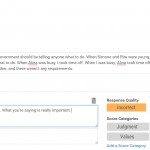Creating the Game
Christina Houle and I decided to team up for this assignment. We tossed around a few ideas for creating something interactive, and she mentioned that she’d previously used Muzzy Lane to create an online interactive game (Muzzy Lane builds software that in turn allows teachers and educators to create games for learning). Christina and I wanted to capture the ways that discussions unfold in real time, while at the same time offering people feedback on argumentation strategies. We thought it would be interesting to allow people to role play a difficult conversation online. By offering players multiple response options (as well as feedback on those responses), we thought the exercise could become more interesting and demonstrate practically how to lead arguments with values.
We decided that our role play scenario was going to be Thanksgiving dinner with a friend’s family. Why Thanksgiving dinner? When we started talking about our own experiences with controversial conversations, we found that these tough conversations often happened with family members. What makes disagreements in this context so difficult is that we care about the people involved, and can’t just walk away even when disagreements can be profound.
The topic we wanted to explore: paid family leave. This is exactly the kind of subject on which members of a family might have very different views. We wanted to bring out the family dynamic, as well as allow different family members to share their experiences.
Our scenario:
“You’re visiting your friend Rita’s family for Thanksgiving Dinner. You’ve never met any other member of the family, and don’t know what people’s political beliefs are. After a warm welcome, you all sit down to dinner. The topic turns to paid family leave – a discussion that has been much in the news. As you navigate the conversation, your goal is to learn what other people’s values are, and use what you’ve learned to guide your responses to what other people say. Hopefully, you’ll learn something new while still advocating for your own position – which is that paid family leave in the United States should be expanded.”
Scoring
Rather than grading responses as right or wrong, we allowed players to earn points for “judgment” or “values.” When players choose to lead with values – which means understanding another character’s point of view – they get a point for values. If, however, they opt to go straight for fact-based confrontation, they earn a point for judgment. At the end of the game, they get a total score and some general feedback on strategy.
Link to the beta version of our game:
https://insights.muzzylane.com/sample/web/bd2ce8b0-3230-432c-a214-d93377c61c50
Our process:
Muzzy Lane’s interface is fantastic! Here’s how we created our exercise, followed by a few screenshots from the actual gameplay.
- Choosing the type of interaction – we chose a module called “insights”
- Once we chose the module, we figured out what we wanted the game to be called
- We started writing out the initial interactions
- Some of our biggest challenges lay in finding different types of arguments, and then figuring out which ones actually led with values
- The system allowed us to create a “scoring” system, which we did through categorizing responses as Judgment or Values based
- The characters introduce themselves
- We decided that the character of Simone would spark the discussion
- The players enter the game by choosing a values-based statement and earning a point for Values
- In their first real challenge, players must choose how to respond to Simone’s statement
- The game interface also allowed us to design interactions between the players, which we did
- The discussion with Simone continues, mimicking a conversation that might actually happen












